Composer Elizabeth Austin
A Conversation with Bruce Duffie
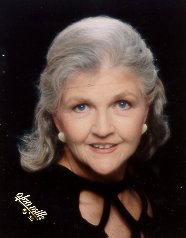
Composer Elizabeth Austin
A Conversation with Bruce Duffie

Born in Baltimore in 1938, Elizabeth Austin received her early musical training at the Peabody Conservatory Preparatory Department. When Nadia Boulanger visited Goucher College in Towson, MD, where Austin was a liberal arts music student, she awarded the composer a scholarship to study at the Conservatoire Americaine in Fontainebleau, France.
Austin has taught composition and theory at various music institutions in Hartford, Connecticut. Her association with the Hartt School of the University of Hartford, where she earned a Master's in Music while on the faculty, continues on an unofficial basis through a faculty/student exchange with the Staatliche Hochschule für Musik Heidelberg-Mannheim, which she helped to initiate in 1990.
While studying for her Ph.D. at the University of Connecticut, Austin won first prize in the David Lipscomb Electronic Music Competition for Klavier Double for piano and tape (1983). International recognition has included her selection by GEDOK (Society of Women Artists in German-speaking countries) to represent the Mannheim-Ludwigshafen region in the national seventieth-year anniversary exhibition (Spring, 1996) in Lübeck. In June, 1998, GEDOK sponsored a retrospective concert of Austin's chamber music in Mannheim. Her Hommage for Hildegard won First Prize in the IAWM's 1998 Miriam Gideon Competition. Besides all this, a doctoral dissertation on her music by Michael Slayton was accepted in 2000 by the University of Houston. Aside from the link in the paragraph below (which shows photos of the WNIB cats and dogs), the rest of the links on this page refer to my Interviews elsewhere on my website.
Dr Austin and her husband, Prof. Gerhard Austin, divide their time between Germany and the United States, as they promote an exchange of ideas and people through internationally sponsored projects, with an emphasis on cultural activities in eastern Europe. She organized an exchange of composers between Rheinsberg and Connecticut in 1997. Often called upon to translate scholarly papers and books, she also acts as interpreter for German-speaking composers. She is President of Connecticut Composers, Inc. as well as organist at St. Paul's Episcopal Church in Windham Center.
Published by Arsis Press and Peter Tonger Musikverlag of Cologne, and
recorded on the Capstone label, Elizabeth Austin is also represented on the
1994 Society of Composers CD and Journal. Her scores are available
through the American Composers Alliance.
In March of 2000, her Drei Rilke Lieder were being performed
in Chicago, so we arranged to meet for a conversation. The day before
her works were given, we went to the Chicago Symphony and returned to her
hotel for the interview. While setting up, we talked about the radio
station and the fact that several
cats and dogs were resident there - even in the control room - and could
be heard occasionally when the microphone was open. So we picked up
on that . . . . .
Bruce Duffie: You write music and I assume you want people to hear it unhampered by extraneous noises. Do you build in an expectation of ambiance or crowd-noises?
Elizabeth Austin: No, I don't think I'm in the direction that John Cage has gone. I love his work for prepared piano, and if I went back into electronic music again, I'd do something with musique concrete, which is really ‘found sound.' So as far as extraneous noise, I'd like to capture it and then do what a composer does, which is order it and filter it through my sensibility. As far as listening, I'm a vessel producing only one of the musics that people listen to these days.
BD: People will listen to a lot of music. Do you want a lot of people to listen to your music?
EA: Of course. I think we all do, but that's not always a motivation. There always has to be a compulsion, and it's taken myself almost half my life to call myself an artist. But I am one because an artist has to have a craft and learn that craft. One has to be born with a certain gift in a certain field, but one also has to have a knowledgeable and critical audience to be able to discern quality. This is what I hope. I'm writing music and presenting it, and we'll see what happens.
BD: Is it for everyone?
EA: I would have to say no. We're elitists, unfortunately. We're at a very sad turn at the beginning of a new millennium, and this is a question which all composers toss around. Do we remain authentic to our voice if our voice is not pleasing to everyone?
BD: Is it pleasing to you?
EA: Exactly. This is where we begin and end.
It's the alpha and omega, or else we will not write something that is authentic
and sincere. You finally reach a point where you say,  "This sounds beautiful to me," so why would you not put it on paper?
Your Chicago Symphony Orchestra asks in its subscription brochure if you
want to 'be moved,' and this is what we all want to do with our art.
We want to move people. Of course, I want people to hear the music,
but once the music is six months old, it becomes part of the cultural unconscious.
It's true. One of my CDs is called "Reflected Light," and I do believe
that one pours the sensibilities of your time into your art, and this is
what you do with your life. I admire craftsmen of all kinds, and I
think this is what we have to do.
"This sounds beautiful to me," so why would you not put it on paper?
Your Chicago Symphony Orchestra asks in its subscription brochure if you
want to 'be moved,' and this is what we all want to do with our art.
We want to move people. Of course, I want people to hear the music,
but once the music is six months old, it becomes part of the cultural unconscious.
It's true. One of my CDs is called "Reflected Light," and I do believe
that one pours the sensibilities of your time into your art, and this is
what you do with your life. I admire craftsmen of all kinds, and I
think this is what we have to do.
BD: You say you want to move people. Do you want to move them in your specific direction, or just in some way?
EA: If you're thinking in terms of ego, I don't know exactly what direction that would be.
BD: Do you want them go in the direction you expect?
EA: If I'm a good composer, then I have a certain amount of control over my music - even though it's aleatoric. I have a design, a plan, a pre-compositional set in mind. So, yes, I would like to persuade. I'm presenting something and trying to persuade. It has to be passionate and it has to be powerful. This may be the key to regain a lost public. I think all of us need to be more passionate. All of us. I think the young people are quite passionate about what they listen to, so we composers need to be authentic in our passion. The audience at the Chicago Symphony tonight were aroused and moved. I was impressed.
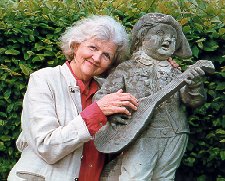 BD: Does this mean that you'd prefer your music on a mixed
concert rather than one with only new works?
BD: Does this mean that you'd prefer your music on a mixed
concert rather than one with only new works?
EA: Yes. Absolutely. One's ears dull if one listens to an all-contemporary concert. I'd love to be showcased with Monteverdi.
BD: You have a certain simpatico with him?
EA: Yes. Call it the New Simplicity.
BD: Do you try to cast your own music as simply as possible?
EA: I don't like to label it, but I try to be direct in my expression and I have wonderful performers. I write for performers. They're my musical blood. This is the catalyst and I've enjoyed some really fantastic performers both here and in Europe. I'm published in Europe and also here in the US.
BD: It doesn't make you schizophrenic to have to flit back-and-forth across the Atlantic Ocean?
EA: It's extremely interesting. We certainly would not feel insecure or inferior if we realized that Europeans are so taken with Cage, Feldman, Harbison, Carter. We really have a repository that we haven't recognized. I have to put in a plug for Hartford. We're in the midst of a two-year tribute called "The Copland Century" honoring him who has produced the best in America.
BD: Will there be a time when we honor Austin that way?
EA: (laughing) Who knows? I do a lot of quoting of music. Many composers do. A wonderful program would be to take pieces which quote and couple them with the home-piece.
* * * * *
BD: Studying other people's compositions the way you do in such depth and with such enthusiasm, does that alter the way you write? Not necessarily the notes you put down, but the way you write and the way you think about writing?
EA: We're all influenced by what we listen to if we're honest. I am a little skeptical about what is completely original. The truth doesn't have to be revolutionary. I have fantastic influences, but when it comes through your sensibilities, your style is going to have the imprint. I can listen and admire Berio and Takemitsu and study their music, then sit down and write something completely different, but have gained craft by studying their music and listening to them.
BD: You've talked of craft, which is the ability to transfer the ideas from your mind to the page. Where is the balance between that craft and the inspiration from your heart and your head?
EA: I approach music, as Stravinsky did, at the piano.
I'm a very kinetic type of composer who works at first in an improvisitory
way with ideas and motives. I'm very textual. I work with words
and literature. That's the big catalyst for me. But the composer
cannot travel with his or her music all over the world, so the score has
got to contain every kind of help available. Spoil the performer to
death! This is what I consider ‘craft' - to put everything that the
performer needs on that piece of paper.
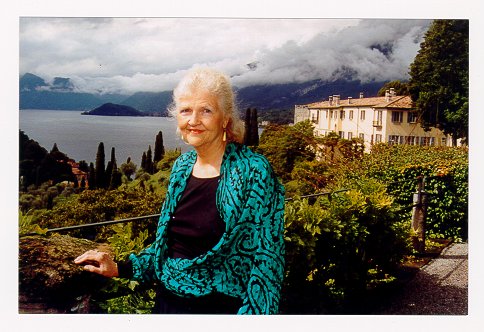
BD: At what point does it start to strangle any kind of invention on the part of the performer?
EA: I never strangle co-creation. The performer is a co-creator. Having said that we need to put down everything possible on the paper, we need that co-creation of the performer. Debussy was the first to admit that. This is why I adore and spoil people who stick their necks out these days to showcase and highlight contemporary music.
BD: At some point, an interpreter is going to go too far. I'm looking for that elusive line.
EA: (laughing) When it comes down to tempi. I really don't like to hear one of my pieces when the metronome marking is changed. I do give flexible limits because it depends on the size of the performing space. However a tempo that is too slow is kind of hard to take. Other than that, I really honor what is done. There are so many different ways to approach one piece of music.
BD: Are they all correct?
EA: Yes. I will stick my neck out to say yes. This why we have so many renditions of the Beethoven 3rd.
BD: I wonder if Beethoven is pleased with all that has been done to and for his music!
EA: Needless to say he's more pleased with some than with others!
BD: Have there been cases where performers found things in your scores you didn't know you'd hidden there?
EA: Yes, and it's wonderful. Years ago, I won First Prize in the David Lipscomb Composition Competition for Klavier Double. The young man who first played it, Dr. Jerome Reed in Nashville, gave a talk and analysis at Catholic University of America, and I was in the audience. It was one of the delights of my life to hear him expound on exactly what I had hoped was clear. I don't like to hide something that should be an aural quote. What's the point of hiding it? If you're quoting something, you want the listener to be engaged. You want them to see the connection and be able to hear it. So Dr. Reed told what I had done, and then went further! The subconscious makes connections and he had ferreted those out. There's a young man now at the University of Houston who is writing a dissertation on my music. When he shows me his thoughts, I'm overwhelmed because he's finding spots in my music which are connections and he asks me if they are purposeful. I have to be honest and it has given me some pause.
BD: I hope it doesn't interrupt your thought in whatever composition you're working on next.
EA: No. Usually I like to work on one composition at a time.
BD: But what he has brought up doesn't make you question what you're doing?
EA: No. You really have to reach a point when your motives have to be pure. You're not out to impress anyone. If you're passionate about what you're doing, you simply want to evoke something and create the very best work that you can at that point. And you hope that you're growing. I feel like I'm in a changing period at this particular point. I'm shedding some skin and moving into another direction, and that's the adventure of it. It's fabulous when that happens.
BD: Are you trying to do this, or are you following what's going on inside?
EA: If you try, then it sounds like you're trying. You're letting it happen. You're allowing this to happen. You're open-palmed, and when pieces fall out of the Heavens, it's rare but wonderful. Then you know you really are connected, but you have to sit down, be humble, and do this every day. Like Nike says, ‘just do it' and it will come.
BD: You have to work at it every day?
EA: I believe so. I'm an early bird, so I try to sit down and do a little bit. When your subconscious is working, you really have to follow it if you can.
BD: Ok, so you're following it and writing things down and tinkering with it and getting it into shape... How do you know when you're finished?
EA: I do a lot with the Golden Mean. If I have a shape of a piece, or a commission for a work of a certain length, I have to decide if it's one movement or several. I like to plan climaxes with certain parameters in mind. I think of the time and plot out the half-way point or the two-thirds point. I do a lot of that.
BD: But once you understand the shape and have gotten everything sketched in and put all the notes on the paper, you go back and refine it and touch it up... At what point do you have to abandon it?
EA: It's my child for about six months. I'm really very stern about training people with ears, and that's your only credential - you have to have a good ear. There are things that a performer will tell you. Usually it's articulation. They tell me I'm explaining what I want, and they expect to see that on the paper. So after about six months, I usually put a piece to bed. After the premiere, it had better be finished. I have revised two pieces, but I usually move on.
BD: Do you write for a specific performer, or just so anyone of that voice or playing that instrument can do it?
EA: I can be inspired by a performer, but it has to be idiomatic for that instrument. I hope that the artsong is coming back - we're in Chicago for such an event. But many times, when you have a sacred text, you have to make a decision between organ and piano. They're two completely different animals. There, I would rather have a different version rather than have the same accompaniment for both.
BD: Tell me the joys and sorrows of writing for and working with the human voice.
EA: You simply have to know the ranges of each type of voice and you have to be very, very careful in approaching those outer limits. I am drawn to literature. My husband is a literature man and we've gone through so much poetry, especially German poetry of the 19th and 20th centuries, which is why I'm here for this Goethe Conference. Some literature and poetry can be beautifully set to music and some is fine in itself. As far as the human voice is concerned, I've been rarely disappointed. I'm very careful to put a lot of pitches for that voice in the accompaniment and try to prepare them. You need to make the singer secure. If that happens and the singer is relaxed, you'll usually get a good performance. So here again, you're going back to a certain amount of craft, and you have to learn that by asking questions. Ask the singers what they prefer and you generally find out.
* * * * *
BD: Did you start out as performer, or immediately begin writing?
EA: I think every composer has to start out as a performer. I had my early training as a pianist at the Peabody Prep in Baltimore, but began writing at age seven. I just started writing a lullaby. There's a school in New Hampshire, right down the road from the MacDowell Colony in Peterborough, called the Walden School. It has a national reputation for training young teenage composers, and I was part of that. So I was very lucky in my musical education.
BD: We've been dancing around it for awhile, so let me ask the easy question - what's the purpose of music?
EA: (laughing) I believe music is a non-worded articulation of communication. Music is meant to move people, to excite people. One has to reflect, be passionate, and if you're successful, you can evoke that same type of passion and excitement and reflection in someone else. It's really one of the highest forms of showing love. There's a wide-range of emotion, but I like to think of it that way.
BD: Are you making love with the performer or making love with the audience?
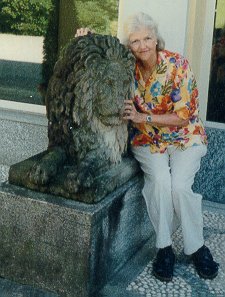 EA: You're loving the world! You're drawing the world
into you and through you. I read this about Takemitsu, that this is
what he was doing. He loves nature, so it's exactly what he was saying.
If you're fortunate enough to do it, you're drawing the world through your
take. I feel blessed that I'm able to do this, and there's no difference
in the product as far as gender is concerned. Women and men are composers,
but we live our lives differently. If you happen to be a woman and
you're writing music, you have to take into account that you're bearing
the children. I have three, and you are primarily responsible for
their physical well-being. So you'll have that famous hole in your
resume for that hiatus. But weeds don't die, so I hope to live a long
life and keep on writing for quite some time.
EA: You're loving the world! You're drawing the world
into you and through you. I read this about Takemitsu, that this is
what he was doing. He loves nature, so it's exactly what he was saying.
If you're fortunate enough to do it, you're drawing the world through your
take. I feel blessed that I'm able to do this, and there's no difference
in the product as far as gender is concerned. Women and men are composers,
but we live our lives differently. If you happen to be a woman and
you're writing music, you have to take into account that you're bearing
the children. I have three, and you are primarily responsible for
their physical well-being. So you'll have that famous hole in your
resume for that hiatus. But weeds don't die, so I hope to live a long
life and keep on writing for quite some time.
BD: Is there difference in the music that comes from a woman and that which comes from a man?
EA: I don't like to think so. I've been asked that many times, but it's just the person. Sofia Gubaidulina is now widely touted, and I question whether the audience thinks of it as coming from a feminine brain. I would hesitate to think that that's the case. You're gender-driven by the way you live your life. This may be changing and women are now having far more forums. We are producing quality music and there are fantastic composers who happen to be women. Hopefully, they are programmed. This is the plight, and that's why there are associations like the International Alliance for Women in Music who try to promote women's music so that we have an equal playing field. But gender plays no role in the finished product. It just has to be quality.
BD: Do you put this ‘quality' into your music, or do you just hope that it's there when you're finished?
EA: The composer is the last person to ask about that! That's what I'm talking about. I really don't like to talk so much about it. I'd rather have the music heard. This is the bottom line. We have to get up and talk a little bit before a contemporary concert, although I find it sad when people ask, "What does it mean?" This is very sad because people can simply listen to music. It doesn't have to mean anything. It simply can be enjoyed in security and I hope that audiences and individuals bathe their ears in every different kind of aural experience.
* * * * *
BD: You do some teaching as well as composing?
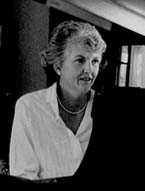 EA: I've taught all of my life. I've done functional
theory and harmony at the keyboard at the pre-college level. I'm at
the Hartt School Community Division. I've taught privately, but in the
past ten or fifteen years, I've given up the majority of my teaching.
It's my turn now.
EA: I've taught all of my life. I've done functional
theory and harmony at the keyboard at the pre-college level. I'm at
the Hartt School Community Division. I've taught privately, but in the
past ten or fifteen years, I've given up the majority of my teaching.
It's my turn now.
BD: I usually ask those who teach if they also get enough time to compose, so obviously the answer is no.
EA: You do need tunnel vision, but you pay your dues. You are a service-person, so you have to pass the tradition on. But there comes a time when you have to take stock and retreat. You give up certain things, but you gain the most important.
BD: Are you optimistic about the future of music?
EA: Oh, very. This is a glorious time to write music because it's a very tolerant time. We are allowing a lot of styles in now. The dogma of having to write in a certain style is gone. There are fantastic performers, and I believe that the best ones are here in the US. There are wonderful performers in Europe with wonderful ears, and there will be a renaissance. I work with young people and we have our ears to the ground, so to speak. We have our program in Germany with young people coming all the time, so I have a reason to be optimistic.
BD: Have you been pleased with the performances you've heard of your music over the years?
EA: By and large, yes.
BD: Are you pleased with the recordings? They have a little more universality.
EA: Yes, I am. I have the wonderful pleasure of having my Wilderness Symphony, set to text by Carl Sandburg, which was recorded in Krakow. I brought two Americans to be the reciters, and asked if they had a banjo player which was called for in the score. They assured me they did, but he turned out to be a mandolin player, so the bluegrass foggy-mountain part sounds a little bit Polish! But I'm very pleased with it otherwise.
BD: Do you like traveling the world with your music?
EA: Yes, oh yes. I listen, then, and make wonderful friends, and I hear music from all of these areas. I must say, though, that my wanderlust has noticeably decreased because time is galloping away. I'm becoming a little bit reclusive because travel cuts into my time for writing.
BD: You can't just write wherever you are - in a plane
or in another city?

EA: You can write down, but I need quiet and I need regular time. That's why we have retreats for artists. You need time to pace and walk about, but on a plane you can do a lot of writing-down, and you can think about how it's all going to connect.
BD: When you're asked to write a work, how do you decide whether to say yes or no?
EA: I can't say I'm a household word yet, but when someone asks me for something, I can think about it and decide.
BD: Are you pleased with where you are at this point in your career?
EA: I want a second life, of course, because I don't have any problems with ideas. They're tumbling out of me. Knock-on-wood, I've never had a block. So I just need more time. I am very heartened and very gratified with where I am at this point.
BD: One last question - is composing fun?
EA: (laughing) I go through the agonies of creation like everyone else. I read books about having courage to create because you're always asking yourself while you're writing if it's any good. Does it have value? Should I add to the world? This is the curse of an artist, so when you have a product that you think is beautiful, then it's super-fun.
BD: I hope all of your creations are beautiful.
EA: Thank you.
= = = = = = =
- - - - - - - - -
= = = = = = =
©2000 Bruce Duffie
Portions of this interview (along with recordings of her music) were presented on WNIB in 2001. The entire conversation was transcribed, posted here, and linked from New Music Connoisseur Magazine in their Fall, 2002 issue
Photos from the composer's collection, and courtesy of the Rockefeller
Foundation
To see a full list (with links) of interviews which have been transcribed
and posted on this website, click here.
Award - winning broadcaster Bruce Duffie was with WNIB, Classical 97 in Chicago from 1975 until its final moment as a classical station in February of 2001. His interviews have also appeared in various magazines and journals since 1980, and he now continues his broadcast series on WNUR-FM, as well as on Contemporary Classical Internet Radio.
You are invited to visit his website for more information about his work, including selected transcripts of other interviews, plus a full list of his guests. He would also like to call your attention to the photos and information about his grandfather, who was a pioneer in the automotive field more than a century ago. You may also send him E-Mail with comments, questions and suggestions.